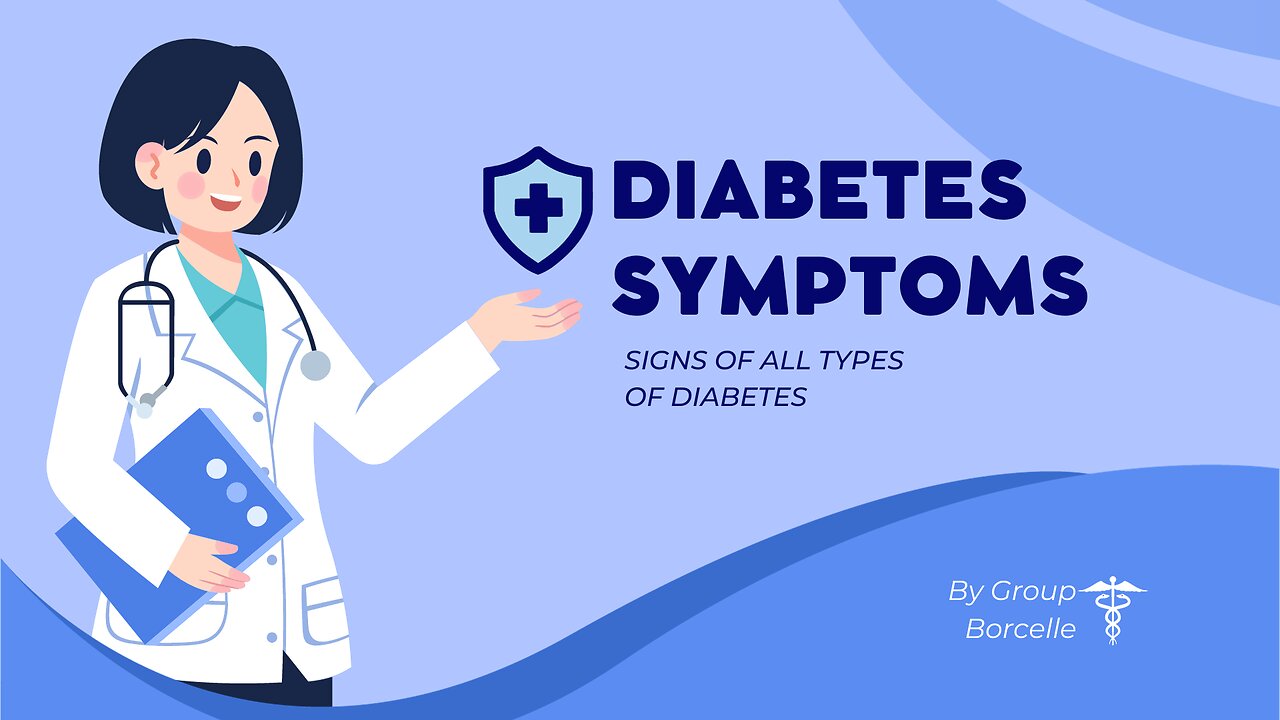Premium Only Content

Diabetes symptoms: Signs of all types of diabetes
The symptoms of diabetes can vary depending on the type of diabetes and the individual. Here are common symptoms associated with both Type 1 and Type 2 diabetes:
Common Symptoms of Diabetes:
Frequent Urination (Polyuria): People with diabetes often urinate more frequently than usual. This is because excess glucose in the blood is excreted through the urine.
Excessive Thirst (Polydipsia): Increased urination leads to dehydration, causing an increase in thirst.
Extreme Hunger (Polyphagia): Despite eating, individuals with diabetes may feel constantly hungry because their cells aren't getting enough glucose for energy.
Unexplained Weight Loss: Individuals with Type 1 diabetes may experience significant weight loss, while those with Type 2 diabetes may experience gradual, unexplained weight loss despite increased hunger and food intake.
Fatigue: Diabetes can lead to fatigue and a general feeling of weakness because the body's cells aren't getting the energy they need.
Blurred Vision: High blood sugar levels can affect the lenses in the eyes, leading to temporary changes in vision.
Slow Healing of Wounds: High blood sugar can impair the body's ability to heal cuts, sores, or infections.
Frequent Infections: Diabetes can weaken the immune system, making individuals more susceptible to infections, especially in the urinary tract, skin, and gums.
Tingling or Numbness: Some people with diabetes may experience tingling or numbness in their hands or feet, a condition known as diabetic neuropathy.
Dry Skin and Itching: High blood sugar can lead to dry skin and itching, particularly in the lower legs and feet.
Yeast Infections: High blood sugar levels can promote yeast growth, leading to frequent yeast infections, especially in women.
It's important to note that some people with diabetes may not experience any symptoms, especially in the early stages. This is why regular check-ups and blood sugar monitoring are crucial for early detection and management of diabetes.
If you or someone you know is experiencing symptoms of diabetes, it's essential to consult a healthcare provider for proper diagnosis and management. Early diagnosis and appropriate treatment can help prevent or minimize the complications associated with diabetes.
-
 LIVE
LIVE
Game On!
9 hours agoNotre Dame proves that the SEC is the WORST conference in college football!
606 watching -
 LIVE
LIVE
Jeff Ahern
1 hour agoFriday Freak out with Jeff Ahern ( The Dr Michael Schwartz interview)
581 watching -
 15:04
15:04
Misha Petrov
19 hours agoThese Leftist Tattoos Are UNHINGED!
9.34K77 -
 8:27
8:27
Dr. Nick Zyrowski
1 day agoWhat to Eat After Fasting - This Diet Heals You!
18.1K10 -
 15:15
15:15
Chris From The 740
12 hours ago $1.30 earnedThe C&H Precision Comp Is The SRO Alternative You've Been Waiting For
17.2K6 -
 24:02
24:02
Bek Lover Podcast
1 day agoAmerica Under Attack - Danger In Every State?
7.28K14 -
 1:03:40
1:03:40
Uncommon Sense In Current Times
1 day ago $0.34 earned"Bar Ministry: Reaching the Lost in Unlikely Places with Randall Reeder"
16.1K4 -
 1:01:01
1:01:01
The Tom Renz Show
21 hours ago"Gates Wants to Meet With Trump & Are Alternative Treatments Really Covered Up?"
7.93K14 -
 2:24:10
2:24:10
Price of Reason
17 hours agoCan Hollywood Recover After Years of WOKE Activism? Will 2025 See B.O. Reversal? Wukong vs Microsoft
53.9K38 -
 10:09:49
10:09:49
Jerry After Dark
20 hours agoHole In One Challenge | Presented by TGL
326K20